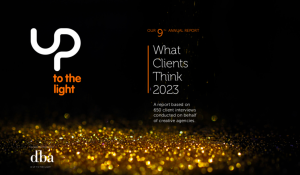Jonathan is founder of Up to the Light and an accredited DBA Expert. He advises a wide range of agencies on all aspects of business improvement and growth, challenging some of the ingrained assumptions that exist in our industry and providing effective, insight-led advice.
Main Content

Five familiar words and what they mean to clients
Does your agency work ‘collaboratively’ with clients? Are you ‘flexible’ in your approach? Do you dig deeper to achieve a better level of ‘understanding’? Perhaps you’re ‘proactive’ with clients and I expect you’d certainly want to be seen as ‘consultative’.
These are familiar client/agency relationship words. We all use them and they tend to trip easily off the tongue, but do they really stand up to examination? We’ve re-addressed some of these stock words and phrases by asking clients for their interpretation. Our new ‘What Clients Think’ report reveals that in some cases the client viewpoint differs markedly from that of agencies and is often more nuanced.
Collaboration
Let’s take ‘collaboration’, one of the most used words on design agency websites. In fact, 23% of clients would like their agency to be ‘more collaborative’. These clients believe that the ‘big reveal’ model is not fit for purpose. They want more interim meetings, more continuous dialogue and more opportunity for client input. The relative silence while the agency goes away to prepare the concepts presentation can be a nervous time. Is the agency on brief, are they pursuing a route that won’t work, why can’t they just share some thinking? Our interviews show that clients’ number one definition of collaboration is where there’s a continuous free flow of opinions and ideas on both sides. The exchanges are open, honest and enjoyable. The agency’s level of proactivity also has a bearing on their view of collaboration. What are the agency’s thoughts and ideas about the client’s wider business, beyond the project in hand? Whether the agency team feels connected is also a factor. Does the team work well together, are different disciplines integrated, do they address specific tasks while seeing the bigger picture?
Flexible
Most agencies pride themselves on being ‘flexible’ and clients see a willingness to accommodate tight and changing deadlines as the biggest example of agency flexibility. Second is an ability to listen and respond to client feedback in an open and non- defensive way. Other most mentioned examples include agency flexibility around processes. Clients often talk about the importance of identifying the difference between a ‘just get it done’ job and something that requires more process and stages. Nothing seems to annoy them more than a one size fits all, rigid process applied to straightforward tasks. A sledgehammer to crack a nut scenario.
Understanding
We found that where levels of agency ‘understanding’ are concerned, brand, market and audience understanding is vital, but clients also see this as something of a given. In pitches, for example, 88% of clients stated that the winning agency demonstrated ‘a greater level of understanding’, but this is often about the agency reading between the lines, identifying the client’s uncomfortable truths and real challenges. Clients talk about the winning agency ‘understanding our anxieties’. It’s a step on from simply showing off their market knowledge.
In established client/agency relationships, our interviews show that agency ‘understanding’ needs to extend to the client’s internal stakeholders, the politics and dynamics of their organisation. Does the agency understand their commercial realities, wider objectives and strategy? All this is instrumental in helping to shift client perceptions of the agency from external supplier to trusted partner.
Consultative
33% of clients would like their agency to be ‘more consultative’. In this respect, their biggest complaint was a consultative approach being evident in initial strategic phases, but then not running through the entire project. In other words, a kind of compartmentalised strategy. For clients, a truly consultative approach is when agencies maintain a level of strategic input and oversight throughout the project and throughout the client/agency relationship, not just in a strategy box to be opened at particular times.
Proactivity
And what about proactivity, the vital component that propels client/agency relationships from good to excellent? Our research shows that high quality, structured client development activity directed at the right client seniority level is essential to their perceptions of proactivity. Not just ‘sales’ and asking for more business, but identifying where and how they can add value. The ability to take a step back from the day to day is crucial. We have yet to interview a client that hasn’t bitten our hand off at the suggestion of a quarterly strategy meeting with their agency – an opportunity to look at wider issues and spot opportunities. Many clients are extremely time pressured, so the agency’s role in thinking wider and longer term is crucial. Clients are quick to tell us when their agency has slipped into brief taking mode with 58% of clients saying they would like their agency to be more proactive. Perhaps the agency is not asking as many questions, sharing less opinions and is less challenging. Perhaps the relationship has gradually become more ‘command and control’ with the client giving direction and the agency becoming ‘Yes’ people.
So, let’s not allow ourselves to be complacent about those familiar words. In clients’ eyes, being collaborative, understanding, flexible, consultative or proactive are difficult to achieve in practice and all have a range of meanings. Let’s take nothing for granted.
About the 'What Clients Think' report
 Published by Up to the Light in association with the DBA, the 9th annual ‘What Clients Think’ report is based on 650 in-depth client interviews, giving you a unique view into client/agency relationships.
Published by Up to the Light in association with the DBA, the 9th annual ‘What Clients Think’ report is based on 650 in-depth client interviews, giving you a unique view into client/agency relationships.
You can download your copy of the ‘What Clients Think’ report here.
DBA members have exclusive access to webinar recordings and can catch up on the ‘What Clients Think’ report launch webinar here.
